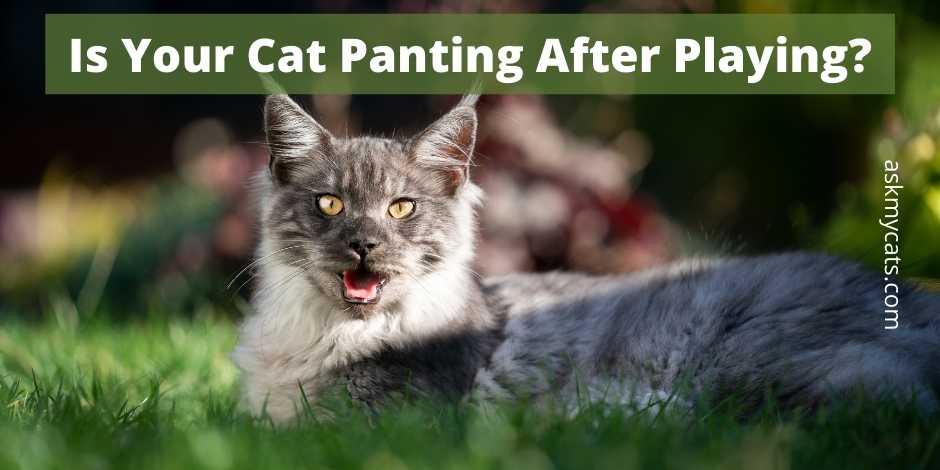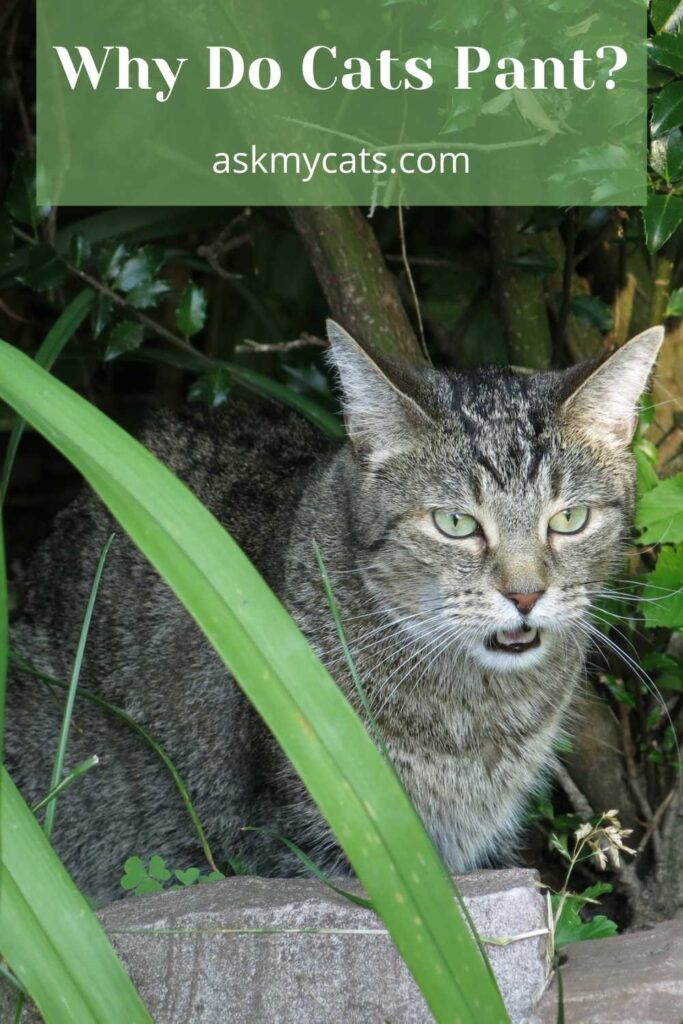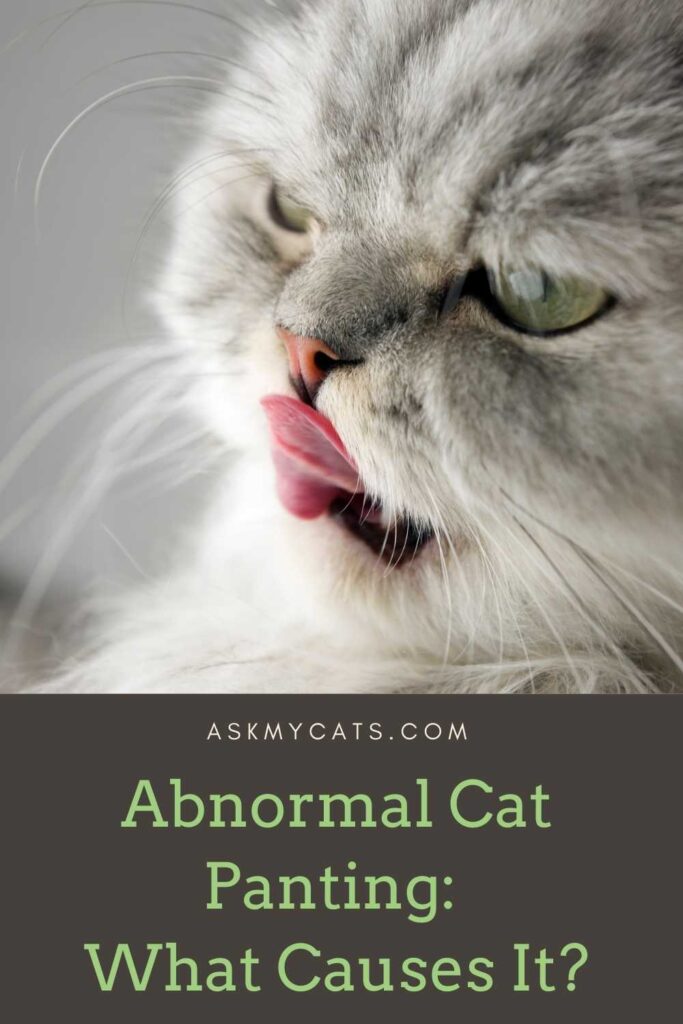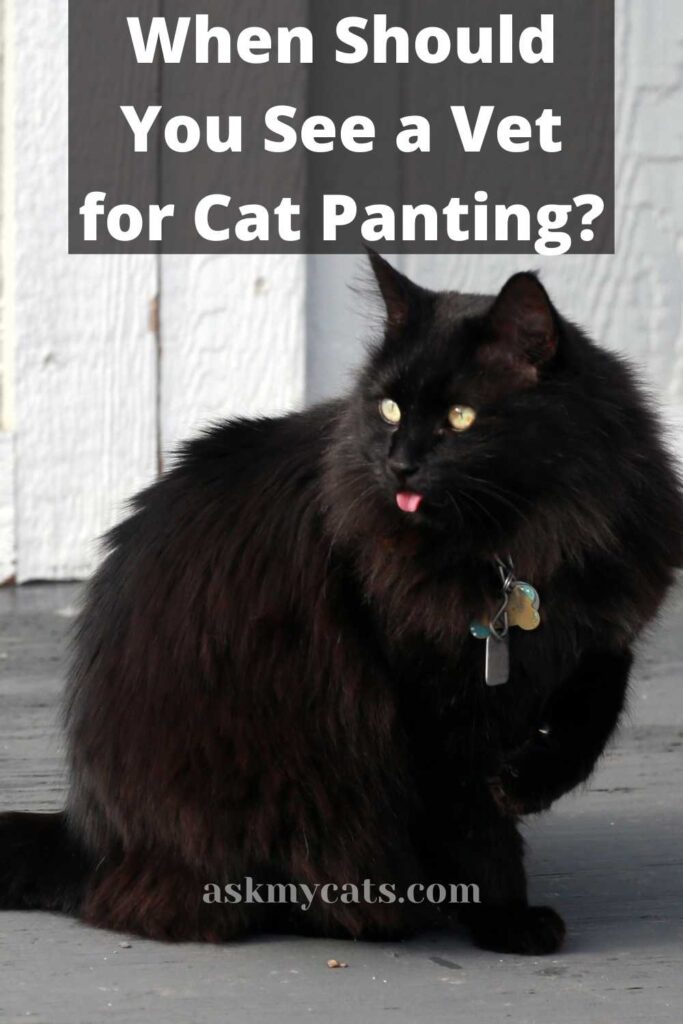It’s no surprise that on a humid summer day cats sit out on a stroll, panting their languages excessively. This is an ordinarily agreed ventilation device for the cats.
Although with our feline mates, that doesn’t happen and we think much about seeing cats panting.
While some cases may be mild, others signal severe complications in which veterinary treatment and attention are necessary
Cats are seen to be panting after a spell of play when they are nervous, excessively hot, or through a disease operation, they only breathe deeply with their mouths open. Panting is normally an indication that your cat isn’t feeling well.


Give Your Cat the Perfect Day
Get the Free Ebook!
Why Do Cats Pant?

Cats do, in fact, pant. Cats, on the other hand, do not normally pant when playing, unlike dogs that do so to cool off. When they do, it is usually very closely associated with physical exertion, lasts for a very brief period, and then recovers rapidly.
Panting in cats resembles panting in dogs in appearance: cats can breathe with their mouth open and tongue out, producing louder breath noises than normal.
While any cat can physically pant, certain species are more prone to it due to their respiratory anatomy or their fur coat.
The body of a cat is extremely powerful, and they seldom breathe through their mouths. So, when we see a cat panting, we know something is wrong.
The key is to evaluate the whole situation involving the panting episode to determine if it is caused by a “natural” cause or an “abnormal” cause caused by an underlying medical condition.
Cats pant for a variety of reasons, including:
- The strong play has recently occurred.
- A new stressor, such as a home renovation or a new houseguest or pet
- Anxiety caused by flight
- Heat exhaustion
Cats can pant for a very short period of time in some circumstances. When a cat is agitated, nervous, overheated, or has just completed a strenuous exercise, these “natural” scenarios will occur.
If you see your cat panting in all of these situations, you should interfere and encourage your cat to rest, sleep, or cool off. If your cat refuses to relax and starts to pant, you can contact your doctor right away.
Also, find out do cats pant when stressed
When Cat Panting Isn’t an Issue
Cat panting is often natural and not a cause for alarm, particularly if you know what your cat was doing just before it started panting.
Panting is a common reaction in cats who are overheated, nervous, anxious, or who have just completed a strenuous exercise. When the cat has had a chance to calm off and relax, the problem should be resolved.
Keep in mind that cat panting is less common than dog panting in these situations, but until you’re certain of the cause, it’s worth bringing to your veterinarian’s attention.
Abnormal Cat Panting: What Causes It?
In contrast to regular panting, abnormal panting in cats usually begins naturally or without any apparent cause.
It often doesn’t go away with relaxation, removing the stressor, or removing the sun, and it’s usually accompanied by other strange behaviors like coughing, lethargy, and an intensified attempt to breathe.
We can see abnormal panting in cats of any age, but kittens and senior cats seem to be more susceptible.
Respiratory illness is unfortunately one of the most important causes we see cats in the emergency room. Excessive panting and other concerning symptoms are often linked to an underlying disorder.
Your cat may show you signs by acting like something is stuck in its mouth!

1. Acute Heart Failure
Cats, like dogs and humans, can develop a variety of heart diseases that result in fluid backup and build-up in and around the lungs, which is one of the hallmarks of congestive heart failure.
Some veterinarians and feline pet owners are frustrated that many cats may have heart disease that goes unnoticed before they have a full heart failure episode.
This is particularly important in the case of hypertrophic cardiomyopathy (or HCM).
The heart muscle thickens, becoming less fluid, and needs to beat even harder and inefficiently as a result of its size.
This disease, which is most common in the Maine Coon breed, can cause trouble breathing, panting, coughing, reduced appetite, weight loss, and, in severe situations, the possibility of blood clots forming and spreading to other areas of the body.
Oxygen treatment, diuretics (medication to help drain pressure from the lungs), medication to help slow the heart rate to allow for more effective heartbeats, aspirin to help avoid blood clots, and other life-saving measures are all used in emergency situations.
2. Asthma
Asthma is a lung disease that affects millions of people and animals.
Many feline pet owners are surprised to learn that this famous human illness will also affect their feline companions!
Feline asthma is believed to be a disease in which a cat’s body produces an allergic response to inhaled contaminants from the atmosphere, causing constriction and restriction of the lungs’ airways. It affects 1-5 percent of all cats.
Asthmatic cats cough, wheeze, sigh or breathe at a higher pace than average, and they can even vomit.
This disease can range in severity in cats, but it can become life-threatening during an asthma attack, just as it can in humans.
Thankfully, cat asthma can be effectively managed by the use of inhaler medicine to administer steroids to the lungs as well as bronchodilators.
3. Infection Of The Lungs
Viruses, bacteria, and even fungal species can cause respiratory infections in cats, which can occur in the nasal passages and lungs.
When these infectious agents infiltrate the respiratory tract, the body’s immune system unleashes a massive inflammatory response in an attempt to combat the illness, resulting in a state akin to that of an asthmatic animal.
Inflammation from a respiratory infection causes cats to have trouble breathing (either too quickly or too forcefully), cough, pant, and become very lethargic.
We treat these cats with oxygen treatment, antibiotics, and humidifiers or steam therapy to try to clean their nasal passages, depending on the cause.
Without aggressive support, upper respiratory viral infections such as Herpes and Calicivirus can be particularly difficult for young kittens.
4. The Infamous Heartworm Disease
Although we usually equate heartworm disease with dogs, cats may also become infected with the parasite after being bitten by an infected mosquito.
While many pet parents are unsure how their indoor cat might get infected, I always ask them how many times their cat sits on a windowsill with the window open and how many mosquitoes they have found inside their homes.
Coughing, panting, and labored breathing are all symptoms of heartworm infection in cats. Unfortunately, cats have no vaccine for this condition, and it is always fatal.
We do, however, attempt to treat these cats with oxygen treatment and steroids to reduce the parasite’s inflammation.
Consult your doctor on the monthly heartworm preventatives for cats that will help your feline family member avoid heartworm disease.
5. Nervousness
Anxiety in cats is a typical cause of normal feline panting, but if it persists in the home or during extended travel, it may become a source of irregular panting.
Speak to the veterinarian about available anti-anxiety techniques, which may include behavioral enhancements, pheromone treatment (calming hormones to hold in the house or in the carrier), and also anxiety treatments and calming aids if you find any symptoms of discomfort associated with panting, such as over grooming, inappropriate urination, hissing, hiding, and reductions in appetite.
You might also like to read about reasons behind cat panting in car
When Should You See a Vet for Cat Panting?

When your pet is panting, it should be treated as an emergency if it happens suddenly, lasts more than a few minutes, and is followed by coughing, trouble breathing, and/or lethargy.
Where in question, I still advise clients to lean on the side of caution. Call the veterinarian, schedule a virtual telemedicine video chat, or come in for an evaluation.
Make sure your cat is in a stable, travel-safe carrier that you can see through on the way to the veterinarian or emergency clinic.
Keep the car cool and play soothing music to make them relax as much as possible.
Give your veterinarian a call ahead of time and let them know you’re coming so they can be ready for oxygen treatment and other life-saving steps if required.
Is your cat begging you for his treatment? Make sure that does not happen.
Frequently Asked Questions
Why is my cat panting with her mouth open?
The breathing pattern of a cat should be fast and unlaboured. Panting is normally an indication that your cat isn’t feeling well. When cats are nervous, excessively hot, or through a disease operation, they only breathe deeply with their mouths open.
How do I know when my cat is tired of playing?
You should avoid playing with your cat if it walks away, becomes upset, furious, stressed, or becomes too stimulated. Many cats prefer several shorter play sessions to a single long one.
Is panting a sign of pain in cats?
If you can’t justify your cat’s panting or rapid breathing for anything as simple as a hot day, it’s possible that his body is unable to get enough oxygen. It’s time to get worried about whether the panting is persistent or followed by drooling, fatigue, or other symptoms of discomfort.
What to do if a cat is breathing fast?
Consider any causes that might be affecting your cat’s erratic breathing and eradicate them from his or her environment. Emotional pain and humidity are two things to consider. If your cat is panting because of the sun, remove them from the heat as quickly as possible and make sure they have access to water.
Why is my cat breathing heavy and fast?
Tachypnea, or rapid breathing in cats, may indicate reduced oxygen levels in the blood (hypoxemia), low red blood cell levels (anemia), or asthma. Fluid in the lungs due to heart disease or fluid in the chest covering the lungs may cause a cat to breathe quickly.
Final Words
Cats don’t pant because there’s a physiological explanation for it.
If you can’t justify your cat’s panting or rapid breathing for anything as simple as a hot day, it’s possible that his body is unable to get enough oxygen.
It’s time to get worried about whether the panting is persistent or followed by drooling, fatigue, or other symptoms of discomfort.
Do let us know in the comments section below if your cat has also suffered through rapid breathing or panting!
